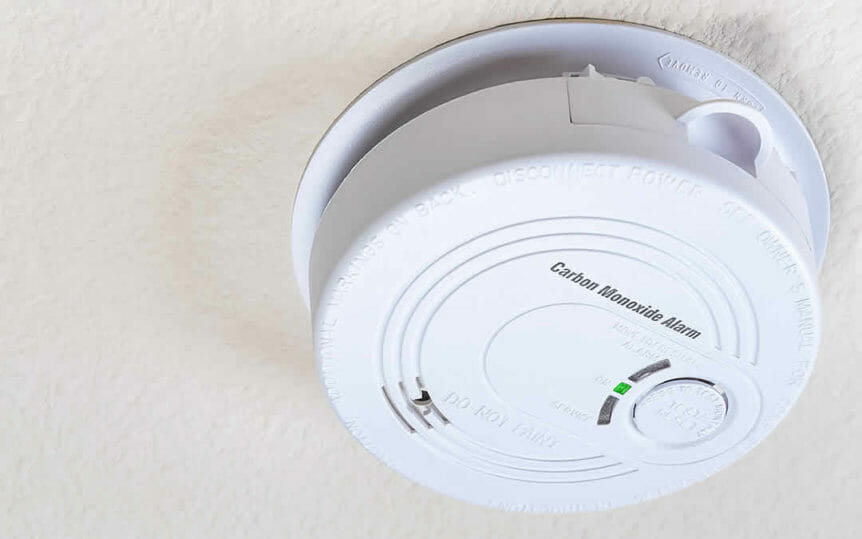
Carbon Monoxide Detectors Are An Important Part Of Home Security
We install home security systems, fire alarms, extra locks on our doors and windows, and motion detectors for the sole purpose of keeping our family safe. And we like to think that in terms of home security we have all our bases covered, right? Unfortunately there is one device that many Houston homeowners tend to overlook, carbon monoxide detectors.
Often deemed the silent killer, carbon monoxide is tasteless, odorless, and has the ability to severely harm or even kill you before you realize it is in your home. According to the Center for Disease Control and Prevention, 400 people die each year from carbon monoxide poisoning, and over 20,000 people visit the emergency room annually due to its poison. But if you install a reliable detector in your home, you can prevent this from occurring altogether. Read on to learn all about CO so you can make sure you are doing everything in your power to prevent it from building up inside your home.
“Anything that burns fuel is going to have some sort of CO. It gets dangerous because when that fuel is not burning properly, it is released into the air, and that’s when people get sick,” said John Moore Services Security Department Manager Ken Hrebec. “Vehicles are one of the main causes of CO poisoning, people leave cars running in the garage and even if the garage door is open CO builds up and gets inside the home.”
What else causes CO poisoning?
You might be thinking that you never leave your car running in your garage for extended periods of time, so you have nothing to worry about. But actually, there are many things inside the home that can release CO. The US Environmental Protection Agency developed a list of items that people should watch out for:
- Unvented kerosene and gas space heaters
- Leaking chimney and furnaces
- Back drafting from furnaces
- Gas water heaters
- Gas stoves
- Generators and other gasoline powered equipment
The keyword in this list is gas. Like we mentioned before, anything that burns fuel should be monitored and properly maintained. Even if your electricity goes out, these appliances and systems will still work, so it’s important to keep an eye out and make sure they are running in optimal condition.
What are the effects of carbon monoxide poisoning?
Lower levels of CO poisoning will cause you to feel flu-like symptoms: dull headache, fatigue, nausea, dizziness, and shortness of breath. It can also cause chest pain for people with heart disease. If you feel these symptoms but they go away once you leave your home, this is a pretty good indication that you have a CO buildup in your home.
High levels of CO poisoning will cause more serious, even fatal effects. If you are exposed for long periods of time, carboxyhemoglobin will form in your blood and will prevent your body from taking in oxygen. This will cause mental confusion, loss of muscular coordination, vomiting, loss of consciousness, and death.
How do I know if carbon monoxide is coming into my home?
“The only way to detect CO in your home is to install detectors, just like smoke alarms,” said Hrebec. “In many areas of Houston it is not required by law to install them in your home, but several jurisdictions require you to. If it’s not required, we can’t force anyone to install a detector, but it is really important to have them because you just never know when you might have a CO buildup.”
There are several different types of CO detectors available:
Sensing Unit: This detector senses the CO in the parts per million. Say you have a slow CO problem, this unit would be able to sense the smallest amount that is in the air and set off an alarm to warn you.
Semi-conductors: They use a silicon chip to detect CO. They must be plugged into a wall, and they require a lot of electricity. When it detects CO in the air, it causes an alarm to sound.
Electro Chemical Sensor: This detector uses a chemical solution with sensors in it which provides an instant response as soon as any CO is detected. These types are generally used for professionals and not seen too often in the home.
You can have detectors installed by professionals, or you can purchase one and install it yourself. If you decide to do it yourself, it’s important to make sure you are following the manufacturer’s recommendations for placement. If you mount your device in a different spot than instructed, you can impede its effectiveness. If you purchase a plug-in device, it’s important to note that they are only good for about two years, and you should test them regularly to make sure they are still functioning correctly.
Other than detectors, how can I prevent CO from building up in my home?
The most important way to prevent a buildup inside your home is to have a professional inspect, clean, and tune-up your central heating system each year. Along with that, the US Environmental Protection Agency has compiled a list of other ways to reduce CO exposure:
- Keep gas appliances properly adjusted
- Consider purchasing a vented space heater when replacing an unvented one
- Use proper fuel in kerosene space heaters
- Install and use an exhaust fan vented to outdoors over gas stoves
- Open flues when fireplace is in use
- Do not idle your car inside the garage
If you take the proper steps to prevent a CO buildup and install reliable detectors in your home, you should never have to worry about an unexpected problem. And if you get the professionals at John Moore Services to inspect your heating equipment once a year, you can rest easy knowing you took the proper steps to prevent CO poisoning in your home.
